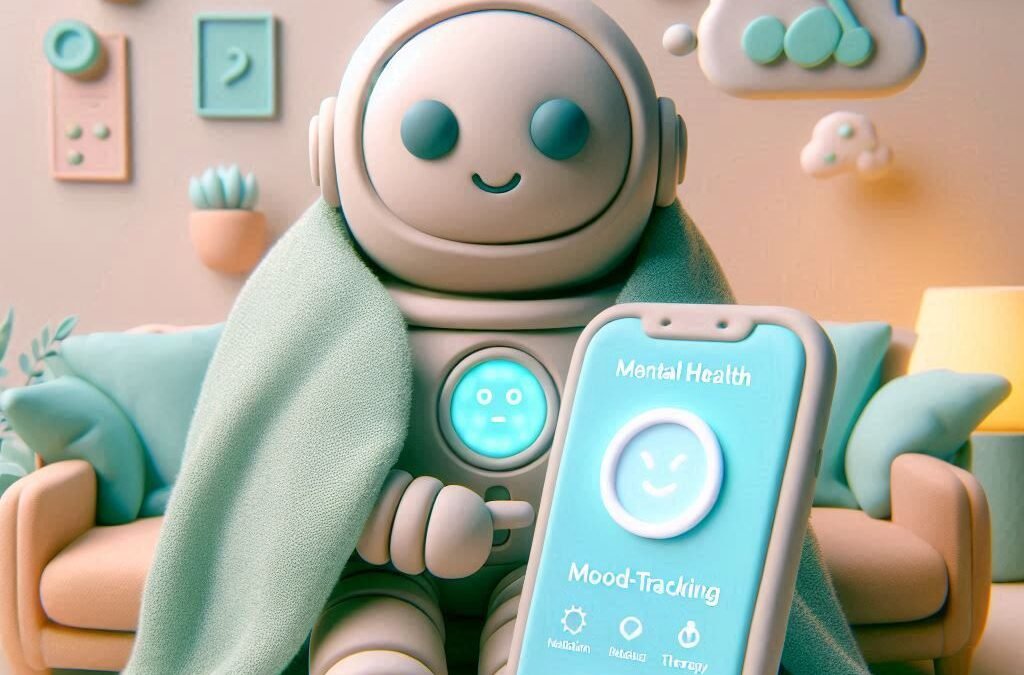How AI is Revolutionizing Mental Health Care: Present, Future, and Practical Steps for You
The world of mental health has always been in a state of evolution, and right now, AI is playing a significant role in driving that change. From offering quicker access to resources to personalized care, AI is starting to make its mark on mental health support. But what does this mean for you, and how can you start benefiting from AI today?
How AI is Currently Helping in Mental Health
AI is already being used to support mental health in a variety of ways. Here are just a few examples:
- AI-Powered Therapy Bots: Virtual chatbots, like Woebot and Wysa, are becoming popular as they provide on-demand, text-based therapy. These bots use natural language processing to offer emotional support and cognitive behavioural therapy techniques. While they’re not a replacement for human therapists, they offer a valuable option for those seeking immediate support.
- Predictive Analysis and Early Detection: AI systems can sift through large datasets to identify patterns in mental health issues. By analyzing social media posts, wearable health data, or even medical records, AI can predict potential mental health challenges before they become critical. This early detection can save lives, especially when it comes to conditions like depression or anxiety.
- Personalized Mental Health Plans: Platforms such as Replika are using AI to offer personalized mental wellness plans. AI helps track your mood, suggests coping strategies, and even recommends specific actions based on your daily experiences.
What Can AI Do in Mental Health?
AI holds the potential to reshape how mental health care is delivered on a larger scale. Some exciting possibilities include:
- AI Therapists: We’re moving toward a future where AI therapists could augment or even replace human therapists for certain forms of mental health care. This would significantly reduce waiting times and make therapy more accessible to people in remote or underserved areas.
- Hyper-Personalization: By analyzing vast amounts of data, AI could soon offer hyper-personalized treatment plans. Imagine having an AI companion that understands your triggers, knows your mood patterns, and offers just the right type of therapy—whether it’s mindfulness exercises, journaling prompts, or physical activity.
- Enhanced Self-Care Apps: Mental health apps using AI can already provide daily check-ins and wellness insights. The future might see these apps become even smarter, predicting mental health dips before they happen and offering real-time suggestions for intervention.
Where AI is Going in Mental Health in the Future
The future of AI in mental health is bright and holds endless potential:
- Integration with Wearable Technology: AI could soon link mental health directly with wearable technology like smartwatches. Imagine your smartwatch recognizing signs of stress or anxiety before you do, and proactively suggesting breathing exercises or sending reminders to take a break.
- AI and VR for Immersive Therapy: Virtual reality combined with AI could create immersive therapy experiences, where patients are guided through scenarios to tackle their anxieties or phobias in a controlled, safe environment. This could transform exposure therapy for mental health issues like PTSD or social anxiety.
- Greater Accessibility and Affordability: With the rise of AI tools, mental health care will become more accessible and affordable. AI-driven platforms could offer services at a fraction of the cost of traditional therapy, making mental health care available to everyone.
What You Can Start Doing with AI for Your Mental Health
So, how can you start using AI to support your mental health right now? Here are a few practical steps:
- Explore AI Therapy Bots: If you’re looking for instant emotional support or a non-judgmental listener, try using an AI therapy bot like Wysa or Woebot. These apps are available on most app stores and offer on-demand support.
- Try Mood-Tracking Apps: Apps like Youper and Replika allow you to track your mood and mental health patterns over time. These AI-driven apps provide tailored suggestions and coping strategies based on your daily input.
- Leverage AI for Meditation and Mindfulness: Tools like Headspace are integrating AI to better understand user preferences and suggest personalized meditation routines. It’s an easy way to integrate more mindfulness into your day.
Looking Ahead: The AI Advantage in Mental Health
As AI continues to advance, the possibilities for its impact on mental health care are endless. In fact, many of the themes explored here are discussed in my book, The AI Advantage: Master Productivity and Mental Clarity. By harnessing the power of AI, not only can we improve our work efficiency, but we can also take proactive steps towards better mental wellness.
As AI evolves, so too can your mental health journey—stay curious, stay open, and explore the tools that are already available to help you live a balanced, mentally healthy life.
References:
- Wysa – AI-powered mental health chatbot offering CBT and emotional support. Website: https://www.wysa.io
- Woebot – AI therapy chatbot using principles of cognitive behavioral therapy (CBT). Website: https://woebothealth.com
- Replika – AI friend offering personalized conversations and mental wellness tracking. Website: https://replika.com
- Youper – AI-driven mental health assistant and mood tracker app. Website: https://www.youper.ai
- Headspace – Meditation and mindfulness app integrating AI for personalized user experience. Website: https://www.headspace.com
- National Institute of Mental Health (NIMH) – Research and insights on AI’s role in mental health. Website: https://www.nimh.nih.gov
- Journal of Medical Internet Research (JMIR) – Studies on AI in mental health care. Website: https://www.jmir.org
- World Health Organization (WHO) – Mental health reports, including the use of technology in care. Website: https://www.who.int
- American Psychological Association (APA) – Research on AI’s impact in therapy and mental health. Website: https://www.apa.org
- AI in Mental Health Research Report by McKinsey – Overview of AI trends in healthcare. Website: https://www.mckinsey.com

